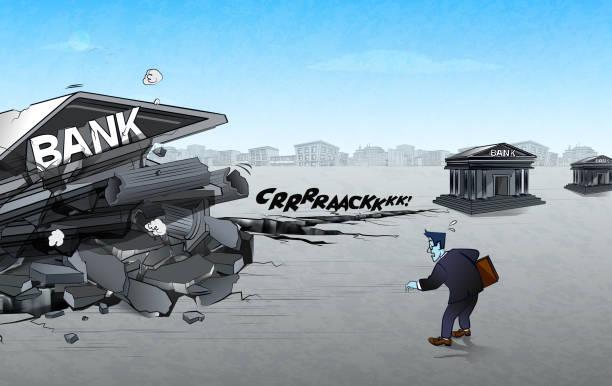Do you understand that the unpredictability of the global economic climate is causing a financial crisis for both businesses and individuals? How can you improve your financial crisis management skills and survive while still growing stronger as a result of the experience? Unexpectedly, a financial crisis can arise, with major economic consequences for both individuals and businesses.
It is important to have a survival strategy in place to manage the consequences of the financial crisis and protect your cash during these times. Maintaining a cheerful attitude and soliciting emotional support from loved ones can be crucial components of surviving a financial crisis.
However, we must first understand what caused the problem in the first place. This article will discuss the causes of the crisis as well as some tips to help you get through the difficult times. By following this advice, you can reduce your financial stress and enhance your chances of surviving the experience.

What is a financial crisis?
A financial crisis occurs when the financial system and its institutions abruptly and drastically cease regular operation, resulting in a severe economic downturn or recession. Financial problems typically result in job losses, bankruptcies, and societal turmoil, and they can have profound and long-lasting consequences for individuals, businesses, and entire nations.
A financial crisis can be generated by several factors, such as a sudden drop in trust in the banking system, high levels of debt, asset bubbles, or other economic imbalances. During a financial crisis, when investors try to liquidate their investments in a panic, the value of assets such as stocks, bonds, and real estate generally declines sharply.
They can also have a long-term impact on individuals and communities, causing social and political turbulence. The financial crisis has the potential to undermine investor confidence and stifle economic growth. This may worsen the recession and lengthen the recovery process.
Governments may also be forced to cut social spending and implement austerity policies, which may worsen income disparity and social unrest.
THE CAUSES OF THE FINANCIAL CRISIS
Decoding the Financial Crisis
You must be aware of the problem because not everyone can identify a financial crisis until it has gotten out of hand. Financial crises are complex occurrences with profound repercussions for economies, businesses, and people.
Understanding the causes of recurrent crises will aid in developing solutions for alleviating their consequences and fortifying the financial system. Let us analyze the different aspects of financial crises and their consequences.
Macroeconomic Factors in Economic Imbalances
The expansion of economic imbalances is one of the primary contributors to financial crises. Uneven income distribution, high levels of borrowing, and unsustainable trade deficits are just a few of the many elements that can contribute to these imbalances. Consumer spending may fall as a result of the concentration of wealth among a few people, and the economy as a whole may experience a general slowdown.
Unchecked borrowing and rising debt levels could result in an unstable and vulnerable financial system. Financial crises can be triggered or exacerbated by macroeconomic forces such as global economic shocks, recessions, and economic imbalances. A sharp slowdown in economic growth or a significant increase in unemployment could put pressure on the financial system.
However, this has the potential to set off a chain reaction of defaults and other financial issues. Natural disasters, geopolitical conflicts, and fluctuations in commodity prices can all have a significant impact on financial market stability.
Market Speculation and Asset Price Bubbles
Speculation in the market and asset price bubbles The formation and subsequent deflation of asset price bubbles are major contributors to financial crises. These bubbles form when the values of specific assets, such as stocks or real estate, diverge from their underlying values. These price increases are typically the result of speculative activity and misplaced elation.
However, the bubble bursts when market sentiment shifts, producing major disruptions in the economy and financial system. Asset bubbles, which are characterized by a fast rise in the price of certain assets, can also cause financial crises. When investors raise asset prices based on forecasted future price rises rather than underlying fundamentals, speculative bubbles may form.
The subsequent market correction after one of these bubble bursts may have domino-like consequences, resulting in an extensive financial crisis.
Banking and Financial Sector Vulnerabilities
The existence and severity of financial crises are substantially impacted by the state and stability of the banking and financial sectors. Financial businesses face enormous risks as a result of lax regulatory frameworks, inadequate risk management practices, and excessive leverage.
Because of these institutions’ interdependence, a crisis in one sector can quickly spread to the rest of the system, amplifying the effects. Historically, failures in the banking and financial sectors have triggered significant economic upheaval.
For example, the global financial crisis of 2007–2008, which wreaked havoc on financial markets worldwide, created the Great Recession, the greatest financial disaster. Lehman Brothers, one of the world’s largest investment banks, went bankrupt as a result of the crisis, which was triggered by the collapse of the US housing bubble.
It also compelled the government to fund unprecedented bailouts for other major financial institutions and corporations. It took nearly ten years to return to normalcy; during this time, millions of jobs and billions of dollars in income were lost.
Global Economic Factors
A financial crisis can be triggered or made worse by global economic problems that are not geographically bound. Trade imbalances, currency depreciation, and economic downturns in one country can all affect the global economy.
Because of the interdependence of the global trade and financial sectors, a crisis in one area can quickly spread throughout the world. To forecast and mitigate the effects of financial crises, a detailed understanding of these interconnected global economic systems is required.
Navigating these links can be incredibly difficult due to the global economy’s complexity and changing nature. Furthermore, the speed with which knowledge and money flow between countries raises the likelihood of financial crisis amplification.
As a result, policymakers and economists must constantly monitor and study these interdependencies to successfully respond to present crises and prevent future ones.
Regulatory Failures And Policy Oversight
The inability of regulators and policymakers to implement effective policies may have a substantial influence on the occurrence and severity of financial crises. Financial instability can thrive in an environment of weak regulation, lax law enforcement, and poor monetary policy.
A lack of accountability and transparency in the financial sector can increase risks and make identifying and responding to future crises more difficult. Inadequate financial industry regulation and control play a crucial role in the occurrence of financial crises.
Because of poor regulatory frameworks and loopholes, risky behavior may go unchecked. Financial institutions that are not properly regulated may engage in predatory lending, undue leverage, or the use of intricate and opaque financial instruments.
Interconnectedness And Contagion Effects
During a financial crisis, problems in one country or industry can swiftly spread to others; this process is known as contagion. Panic, a loss of confidence, and a general aversion to risk can all cause this contagion effect. The initial shock could start a chain reaction that leads to a larger calamity
Containing and isolating these contagious effects is exceedingly challenging for authorities, and worldwide cooperation is required. Policymakers must work together to implement initiatives that restore stability and confidence in harmed sectors or nations.
To halt the spread of infection, legislative measures, monetary assistance, and international cooperation may be necessary. The interconnection of financial institutions and markets is a crucial factor in the spread of the financial crisis. When a single institution or market encounters difficulties, the effect swiftly spreads to others.
Interruption in Digital Advancement
Technological insecurity can potentially lead to financial disasters in today’s fast-changing digital economy. The dependence on complicated algorithms, automated trading programs, and high-frequency trading is expanding, which may raise market volatility and increase the possibility of unexpected price fluctuations.
Furthermore, due to the possibility of data breaches, fraud, and disruptions in financial services, cybersecurity concerns pose a danger to the profitability of financial institutions. These disturbances have the potential to have far-reaching implications, affecting not only confident investors but, potentially, entire economies.
To mitigate these dangers, regulators and financial institutions must constantly upgrade their cybersecurity defenses while simultaneously monitoring and restricting the use of advanced trading tools.
Excessive Stimulation and Risk-Taking
Excessive speculative activity and risk-taking in financial markets are major drivers of the financial crisis. Systemic vulnerabilities can arise as a result of excessive risk-taking by individuals or organizations that lack appropriate risk management strategies. This behavior is frequently caused by uncontrollable enthusiasm and the belief that good times will never end.
These risks, however, might appear quickly and result in huge losses if market conditions change or unexpected occurrences occur. As a result, widespread financial instability and panic may occur. As a result, market participants and authorities must keep a close eye on and limit excessive risk-taking to prevent future financial crisis.
Lack of Transparency and Information Asymmetry
A lack of openness and information asymmetry usually exacerbate financial crises. When market participants are unable to accurately evaluate the risks associated with certain investments or when vital information is hidden or distorted, it can result in improper capital allocation and eventual financial instability.
Market integrity is dependent on clear and honest reporting as well as strong disclosure standards. Furthermore, information asymmetry may lead to an unequal playing field in which some market participants have access to sensitive information that gives them an unfair advantage over others. As a result, investor confidence may suffer, and market inefficiencies may worsen.
To guarantee that everyone has an equal chance of success, regulatory measures encouraging transparency and equitable access to information should be put in place.

CONSIDERATION AND ALTERNATIVE SOLUTIONS FOR BANKRUPTCY
In some cases, bankruptcy may be the only viable option. We will look into the consequences of bankruptcy, including how it may influence credit ratings and future financial prospects. We will also discuss some other options that may help you avoid bankruptcy entirely.
Because of the long-term repercussions on credit scores and financial reputations, bankruptcy should be considered a last resort. Here are some additional choices to consider:
Discretionary Discussion With Creditors
Contact your creditors to discuss payment plans, debt settlements, or short-term moratorium agreements. Creditors may be more willing to work with you and offer more favorable terms if you participate in open communication and demonstrate your commitment to repaying your obligations.
Furthermore, seeking assistance from a certified credit counseling agency can provide guidance and support in developing a sustainable repayment plan tailored to your specific financial situation.
Advice on Credit
Budgeting, debt management, and creditor negotiations can all be aided by non-profit credit counseling groups. They can help you analyze your income and outgoing expenditures so that you can establish a budget that allows you to pay your financial obligations while still meeting your fundamental necessities. Furthermore, because credit counseling groups typically have existing relationships with creditors, they may be able to fight for you and negotiate lower interest rates or longer repayment terms.
Debt Management Plans (DMP)
As part of a DMP, you will work with a credit counseling service to negotiate lower interest rates and more manageable monthly payments with your creditors. Combining your debts with a DMP may make it easier to manage your monthly payments and keep control of your financial commitments.
Furthermore, credit counseling firms may offer you significant financial coaching and guidance to help you improve your money management skills and prevent debt in the future.
PROCEDURE TO SURVIVE AND EXCEL IN THE CRISIS
Make And Follow A Budget
Having a budget in place is essential during a financial crisis. Budgeting helps you understand your income and expenditures and discover areas where you may save money. You may prioritize expenses such as food, housing, and health care. Additionally, staying within your budget might keep you from overspending and accumulating debt.
Making a budget and assessing your financial situation are the first steps toward surviving an economic calamity. After estimating your income and expenses, prioritize critical items such as rent, food, and utilities. Reduce non-essential expenditures on things like entertainment, vacations, and eating out. Keep to your budget to avoid overpaying.
Making a budget also allows you to discover where you might be able to minimize expenditures, such as by seeking less costly solutions for certain spending or negotiating lower rates. You can also stay on track and make the necessary changes if your financial situation changes by routinely analyzing and updating your budget.
Reduce Irrational Expenses
During a financial crisis, reducing excessive expenditures is crucial. Examine your spending habits thoroughly to identify areas where you might save. Reduce your usage of restaurants, cancel subscription services, or reduce your home or automobile usage. Lowering your expenditures can help you save money for important expenses and build an emergency fund.
It is important to cut non-essential spending amid a financial crisis. Examine your monthly subscriptions; cancel those that you don’t require and barter for cheaper costs on those that you do. Consider using coupons, shopping during discounts, or buying in bulk to lower the cost of daily expenses such as food.
Making a budget and tracking your spending can help you understand where your money is going and where you may save more. Being proactive and implementing these measures might assist you in maintaining your financial stability through a financial crisis and difficult times.

Build An Emergency Fund
Establishing an emergency fund is important for financial planning because of an unforeseen occurrence. Save enough money in an easily accessible account to cover your living expenses for at least three to six months. In this manner, you have a safety net in case you lose your job, have a medical emergency, or incur unforeseen bills.
It is critical to maintain a six-month emergency fund on hand. This fund may be handy for addressing unexpected expenditures such as medical bills or automobile maintenance. Begin small and set aside a certain amount each month for your emergency fund. Having a healthy emergency fund may save your life during difficult financial circumstances.
We will guide you through the process of establishing an emergency fund, advising you on the appropriate amount to set aside and the best sorts of assets to preserve its value.
Diversify Your Income Sources
Having many revenue streams may keep you afloat amid a financial crisis. Consider taking up a second job or working part-time to augment your major source of income. This allows you to lower your debt and boost your emergency fund while maintaining your present standard of living. If you have lost your job or will soon be experiencing a pay cut, look into alternate income sources.
Also, start a side company or take a part-time job. The Internet provides several opportunities to increase your income, including online tuition, freelancing, and selling goods and services. You may supplement your primary source of income with these opportunities since you can work from home and have flexible hours.
Furthermore, experimenting with diverse revenue sources might offer you useful skills and experiences that may lead to new professional opportunities in the future.
Debt Reduction
When confronting a financial crisis, making debt repayment a high priority may help you avoid paying more interest and fees. Pay off credit cards and other high-interest obligations first. Also, you might consider debt consolidation or negotiating reduced interest rates or monthly payments with your creditors.
Pay off your debts first, such as loans, credit card balances, and mortgages. Prioritize paying off high-interest payments first, and consider negotiating better terms with your creditors. By making paying off high-interest debt your top priority, you may save money in the long run and improve your entire financial situation.
A credit counseling group or financial adviser can also equip you with specific techniques to properly manage your debt during a financial crisis.
Be Proactive And Well-informed
Be proactive and well-informed. You may better prepare for such issues by staying current on the state of the economy and labor market. Prepare by keeping your résumé up-to-date, building relationships with potential employers, and researching new job opportunities. You will be better prepared to deal with any financial upheaval this way.
To save more money, it’s vital to regularly review your expenditures and identify areas where you can cut back. By taking these proactive actions, you may strengthen your financial stability and improve your ability to deal with unexpected financial losses.
Consider diversifying your revenue streams by examining side enterprises or investing in passive income opportunities. This might give you a second source of income while also improving your financial management skills.
Explore Government Aid
Governments typically give aid during times of financial crisis. Determine whether you are eligible for any financial assistance programs, such as small business loans or unemployment compensation. These efforts can provide immediate support and help with the payment of relevant charges.
Learn more about any non-profit organizations or community services in your region that might be able to assist you in difficult times. These tools may provide you with further assistance and guidance on how to handle your money effectively. It is critical to stay current on any updates or changes to government aid programs.
Keep an eye on official government websites or contact your local government offices to acquire the most up-to-date and accurate information. Don’t forget to take advantage of any counseling or financial planning services that may be available to help you get through these trying times.
Financial Education Is An Investment in Oneself
During a financial crisis, it is easy to give up on personal development and lose hope. However, investing in yourself by going to school, acquiring training, or learning new skills may make you more employable. Investing in yourself can enhance your chances of finding stable employment as well as your long-term financial prospects.
Taking steps to improve your knowledge and talents can also help you feel more empowered and confident in difficult situations. Personal development may also result in improved levels of contentment and a sense of purpose in life. A sense of accomplishment and personal growth that comes from investing in yourself may help you feel better physically and psychologically.
Employ Professional Advice
If you are having difficulties managing your money, go to a financial expert like a financial planner or a credit counselor. They can help you create a customized financial plan and manage your money in an emergency. They may also offer guidance on how to save money, reduce debt, and make sensible investment decisions.
Furthermore, they can assist you in navigating difficult financial situations such as bankruptcy or foreclosure by providing you with the tools you need to reclaim control of your financial future. Meeting with these specialists may provide you with the knowledge you need to take proactive steps toward long-term financial stability.
Retirement Planning
Take advantage of tax-favored retirement programs and begin saving for retirement as soon as possible. By starting early, you may benefit from compound interest and potentially see significant long-term growth in your savings. You could also consider diversifying your retirement portfolio to decrease risk while increasing potential benefits.
You may diversify your retirement portfolio by investing in various shares, bonds, and mutual funds. You may have a higher chance of realizing more rewards if you spread out your risk. Change your retirement plan as required to maintain it in line with your changing financial goals and circumstances.
Goals Setting
Set precise short-term and long-term financial goals to stay motivated and committed to your financial plan. Long-term goals may include saving for retirement or purchasing a home, but short-term goals may involve paying off a specific debt or saving for a trip.
By setting these goals, you can track your progress and make the necessary changes to ensure you stay on track to meet them. Keep in mind that if your financial situation changes, you should examine and revise your goals regularly.
Regular Review
Regularly reviewing your financial strategy can help you stay on track. By frequently analyzing your financial plan, you can keep it in line with your changing financial circumstances and aspirations. You may then optimize your investment strategy for the highest potential returns and make the necessary changes.
You may also see potential opportunities or risks that may require altering your investment portfolio when market movements and economic conditions change.
Insurance Policy
Get adequate health, life, and property insurance to protect yourself against unanticipated disasters. You must have adequate insurance coverage to protect your financial stability in the event of an unforeseeable tragedy.
It provides a safety net that may assist in covering medical expenses, protecting your loved ones in the event of your death, and avoiding financial losses caused by theft or property damage. By purchasing comprehensive insurance packages, you can rest assured that you are prepared for any unexpected disaster.

Conclusion
The financial crisis is a complex phenomenon with several core causes that can have far-reaching consequences for economies and people. To address these issues, a comprehensive plan including increased regulation and monitoring, risk management processes, transparency, and proactive efforts to remedy economic imbalances is required.
Understanding the underlying causes of financial crises will help us develop a better, more stable financial system. Survival and success amid a financial crisis require self-control, planning, and the capacity to make difficult decisions. Although handling a financial crisis might be challenging, you can succeed and even survive during the period.
Finally, overcoming a personal financial crisis and avoiding bankruptcy requires determination, self-control, and a well-planned approach. To attain long-term financial well-being, consider contacting a professional as well as continuing to learn about money-related subjects and financial education.